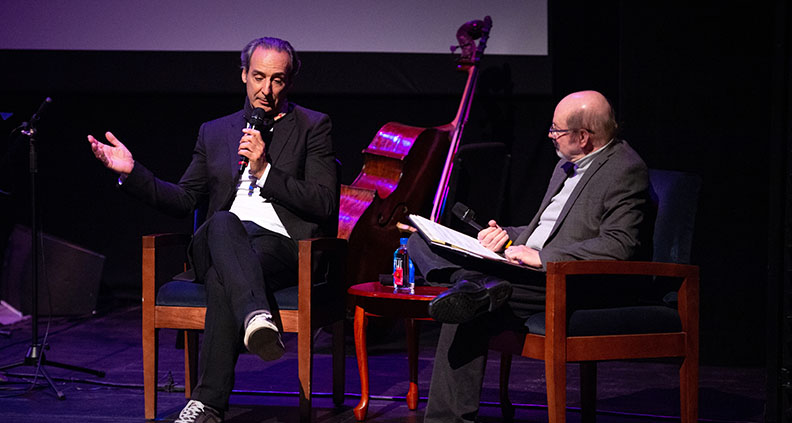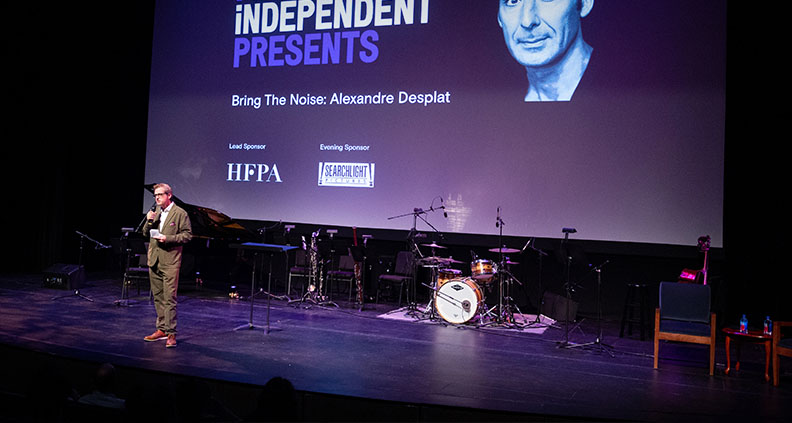Alexandre Desplat Chats and Plays ‘The French Dispatch’ Hits… LIVE
As part of our weeklong takeover of the Wallis Annenberg Center for the Performing Arts in Beverly Hills last week, Film Independent’s Bring the Noise series returned–revived and reimagined by none other than the sublimely lyrical French film composer Alexandre Desplat.
Amid a stage crowded with instruments for a climatic live performance of selections from his recent score to Wes Anderson’s The French Dispatch, the Oscar winner first sat for an extended conversation about his work and career with journalist and film music historian Jon Burlingame.

Marveling at a clip of The French Dispatch, Desplat said of his collaborator’s visual style, “It’s just crazy. I mean the detail of each shot is like a painting. It’s just crazy.” Burlingame agreed, saying, “It’s so rich visually.” Desplat continued: “You can watch it again and again.”
“Can you talk about writing for a France that emerges from Wes’ imagination instead the France you live in?” Burlingame asked. “This is a fantasized France,” Desplat said. “It’s a mix of Dounou and Breson, Troufou and Becker. The photographers and directors of the 50s and 60s, but mixed through Wes’s eyes and Wes’s memory–it’s not France, it’s ‘France’ from Wes’s world.”
Desplat added, “The score never plays France. It never tries to sound French. There’s no accordion, no waltz. As I was playing the piano parts in rehearsal today, I thought some of the piano parts are more bluesy. They play more American than French.”
Desplat’s French Dispatch score seems to match both the meticulousness of Anderson’s filmmaking while playing counter to the amazingly dense amount of dialogue and onscreen detail. The music fits seamlessly into the heightened, hyper-visual tableau while playing only to the internal ticking of the film. The sparseness of the instruments makes each voice audible just as Desplat desired. As he explained, “I like to use just one of each instrument. I don’t like to loose the melody in a large ensemble.”
When Burlingame asked Desplat for his general philosophy of film music composition, Desplat said: “Try not to place the music where it is obvious. Start and stop at different places that are not expected. Let the actors breathe and live their own moments. When the music comes in, try to create an accident–something that makes the image shake so there is a new sensation.”
“You might not realize as you are watching the film, because the music doesn’t need to be loud, but if the music creeps in you should feel the emotions grow bigger–in any direction. Music can do that really, really well,” he continued.
Desplat added: “It takes me a long time to find the right place, the right balance, the right orchestration to find this vibration. But when you find the right balance between tune, chords, instrumentation and rhythm you can feel that the music is part of the film that it’s really dancing with the actors. And dancing with the drama. It takes the audience by the hand. Cinema is [like] staying in childhood. And music can terrifically emphasize that.”

Next, we got to hear live performance of a few pieces from The French Dispatch. “The instrumentation is very versatile in Wes’s films,” Desplat explained. “For this [performance piece], it is the same with tuba, harpsichord and bassoon, etc. We tried to put together a few pieces to give a sense of what the score is.”
The live music was wonderfully understated, yet evocative. The instruments were bassoon, piano, oboe, flute, drums, bass and banjo. We first heard the piano and bassoon in a gentle duet. Then a wonderful piano with woodwinds. And finally, the bass and drums joined in. In the final piece the banjo played humorous lines that echoed a bit of the blues inflected melodies on the piano. The banjo also provided some effects with fast, abrasive strumming.
The overall effect was a typically transparent Desplat orchestration that allowed each instrument room to be heard and provide its own character. It was a night to experience the inimitable music and personality of Alexander Desplat who is by turns humorous and light hearted and deeply considered in his approach.
More Film Independent at the Wallis…
- Maggie Gyllenhaal career retrospective
- Alexandre Desplat live performance
- Denis Villeneuve Dune deep-dive
Alexandre Desplat wins the Oscar for Best Original Score for The Grand Budapest Hotel:
Film Independent Presents is supported year-round by Lead Sponsor the Hollywood Foreign Press Association. Additional support for these special events at The Wallis provided by Warner Bros., Searchlight Pictures, Netflix, Apple Original Films and Lionsgate.
Film Independent promotes unique independent voices by helping filmmakers create and advance new work. To become a Member of Film Independent, just click here. To support us with a donation, click here.
